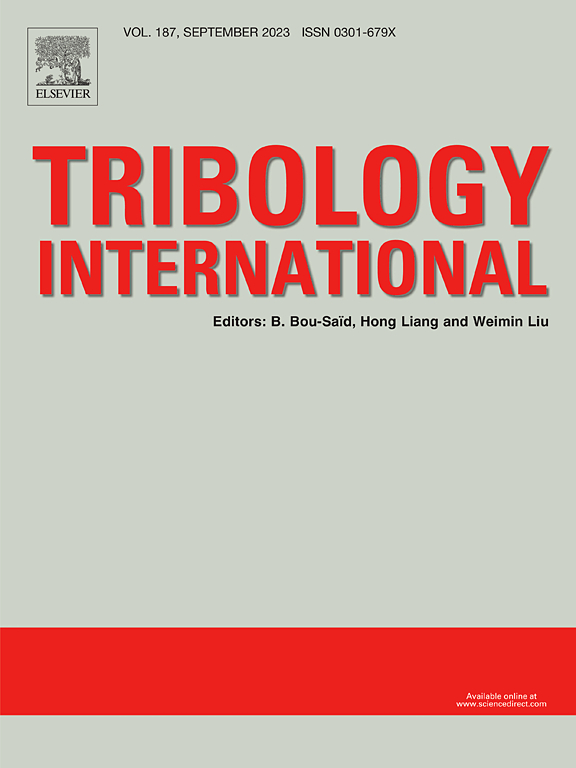The enhanced lubrication effect by ZDDP under limited lubricant supply condition
IF 6.1
1区 工程技术
Q1 ENGINEERING, MECHANICAL
引用次数: 0
Abstract
A limited supply of lubricant can minimize energy dissipation and waste, enabling lean lubrication. However, insufficient lubricant supply can lead to a critical issue known as starved lubrication, emphasizing the need to address this concern under limited lubricant supply (LLS) condition. In this study, a ball-on-disc lubricating film test rig, with a circular contact, was employed. The impact of zinc dialkyl dithiophosphate (ZDDP) interfacial adsorption on the lubrication characteristics under LLS condition was investigated by introducing ZDDP as an anti-wear additive. A dichromatic interference intensity modulation (DIIM) approach was utilized to reveal the evolution of the lubricant film at various lubricant supply stages under LLS. Three distinct lubricant supply stages were identified: the fully flooded stage, the transition stage from fully flooded to starved lubrication, and the starved lubrication stage. The mechanism of ZDDP interfacial adsorption during different lubricant supply stages was evaluated by analyzing variations in oil reservoir morphology, lubricant film thickness, and friction coefficient. The results indicate that, under LLS conditions, changes in the oil reservoir directly influence the transition between lubricant supply stages. The adsorption effect of ZDDP was found to promote lubricant entrainment and improve the lubricant supply in the inlet area during the second and third lubricant supply stages, thereby enhancing the anti-collapse capacity of the lubricant film. Additionally, in the LLS condition, the improved anti-friction effect of ZDDP is attributed to the synergistic impact of enhanced lubricant entrainment and increased shear resistance.
求助全文
约1分钟内获得全文
求助全文
来源期刊

Tribology International
工程技术-工程:机械
CiteScore
10.10
自引率
16.10%
发文量
627
审稿时长
35 days
期刊介绍:
Tribology is the science of rubbing surfaces and contributes to every facet of our everyday life, from live cell friction to engine lubrication and seismology. As such tribology is truly multidisciplinary and this extraordinary breadth of scientific interest is reflected in the scope of Tribology International.
Tribology International seeks to publish original research papers of the highest scientific quality to provide an archival resource for scientists from all backgrounds. Written contributions are invited reporting experimental and modelling studies both in established areas of tribology and emerging fields. Scientific topics include the physics or chemistry of tribo-surfaces, bio-tribology, surface engineering and materials, contact mechanics, nano-tribology, lubricants and hydrodynamic lubrication.
 求助内容:
求助内容: 应助结果提醒方式:
应助结果提醒方式:


